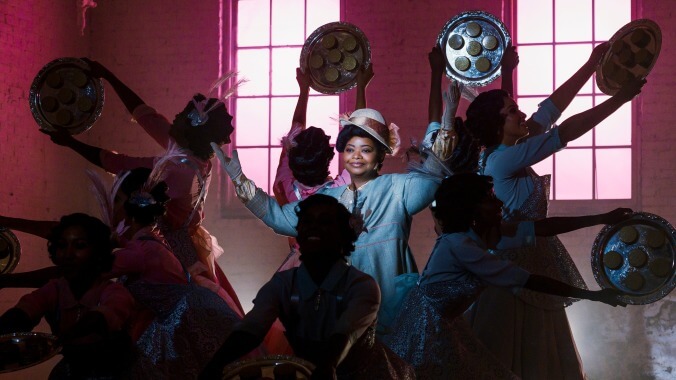Very rarely, when one sits down to watch a new show, does the sensation strike that the story being told holds vital importance. But Self Made: Inspired By The Life Of Madam C.J. Walker holds that distinction. The four-episode limited series features a Black women-led team, with directing from Kasi Lemmons (Eve’s Bayou) and DeMane Davis (Black & White & Red All Over), and writing from Nicole Jefferson Asher (Toni Braxton: Unbreak My Heart) and A’Lelia Bundles (Boss: The Black Experience in Business). Together they churn out one of the best productions on the experience of living with Black hair in America. It’s far from perfect, bogged down as it is in its love for a capitalist system, but the show sheds light on a woman who should be known to every American.
Sometimes it’s family that impedes her progress. Before the big move to Indiana, Walker’s daughter, A’Lelia (Tiffany Haddish), marries a simple boy who wants to start a juke joint where she will be the crown jewel and the club’s main singer. The plan falls off track when the couple realizes A’Lelia can’t sing, and her husband has no idea how to run a business. It’s easy to see why a casting director or producer would think of Haddish to portray A’Lelia, who Langston Hughes dubbed the “Joy Goddess of Harlem’s 1920s.” The actor’s radiant energy, quick smile, and big laugh all ring true. But Haddish, who gives her all to each scene, is outpaced by Spencer, Garrett Morris, Blair Underwood, and Carmen Ejogo. Every line comes off as a joke, and it slows the show down terribly.
Ejogo is a revelation as Addie, a scheming bully who puts women in their place but who quickly evolves into a complex woman navigating the lie she’s been told all her life: her light skin and “good hair” made her better than other Black women. Hilarious, wise, and ready to share his truth with anyone who will listen, C.J. Walker’s father, Cleophus, is the role Morris was born to play. Underwood taps into his soap opera roots to brings out the charm, self-obsession, and insecurity of Charles James Walker, C.J.’s husband.
Avoiding the truly devastating parts of Madam C.J. Walker’s life allows the show to engage in the ridiculous. Gorgeous costumes change every scene, even before Madam makes her millions; giant hair pieces, lavish sets, and the entire spectrum of emotional drama are on display. Self Made is a lot of fun, if not always historically accurate, while running the gamut of Black issues. There’s a strong through-line of colorism and how it affects the way Black women see themselves. Addie is both a villain and a person who desperately needs a hero. Her mother, who recounts how “master cursed (her) with a daughter,” is emotionally distant, but relies on her daughter for money, a burden Addie struggles with. The show explores how Black men have told Black women to wait their turn in line, and takes a big swing at one Black leader’s history. The mapping of these issues is so blatant, they can be seen coming a mile away, but they’re managed with such enthusiasm that it’s almost endearing.
The show feels like a chorus of Black women celebrating the success of a founding mother. Through the cheers, there’s often misinformation, mistakes are glossed over, and everything ugly (like theft) is made beautiful. This feels like a uniquely Black American experience—when one of us succeeds, our families imagine even greater success. Accomplishments are celebrated, not exaggerated, and interpreted as the foundation for the next big step.
Self Made exists on hope; hope that the voices of Black women throughout the ages will be heard clearly, and that space will open up for them to get their piece of the American Dream. This dream seems outdated as we head into the second recession in two decades, and everyone’s on lockdown. But, it’s been the dream for so many years, it’s hard to fault the show’s creators for celebrating it. Too many have suffered under capitalism to view Madam C.J. Walker’s story as anything other than an anomaly. This is the stuff of American fairy tales, and for so long the fact that a Black woman accomplished it was hidden. So why not celebrate it now? The dream rings hollow, but it’s still a fun journey to watch, as long as you can tell facts from fairy tales.



 Keep scrolling for more great stories from A.V. Club.
Keep scrolling for more great stories from A.V. Club.